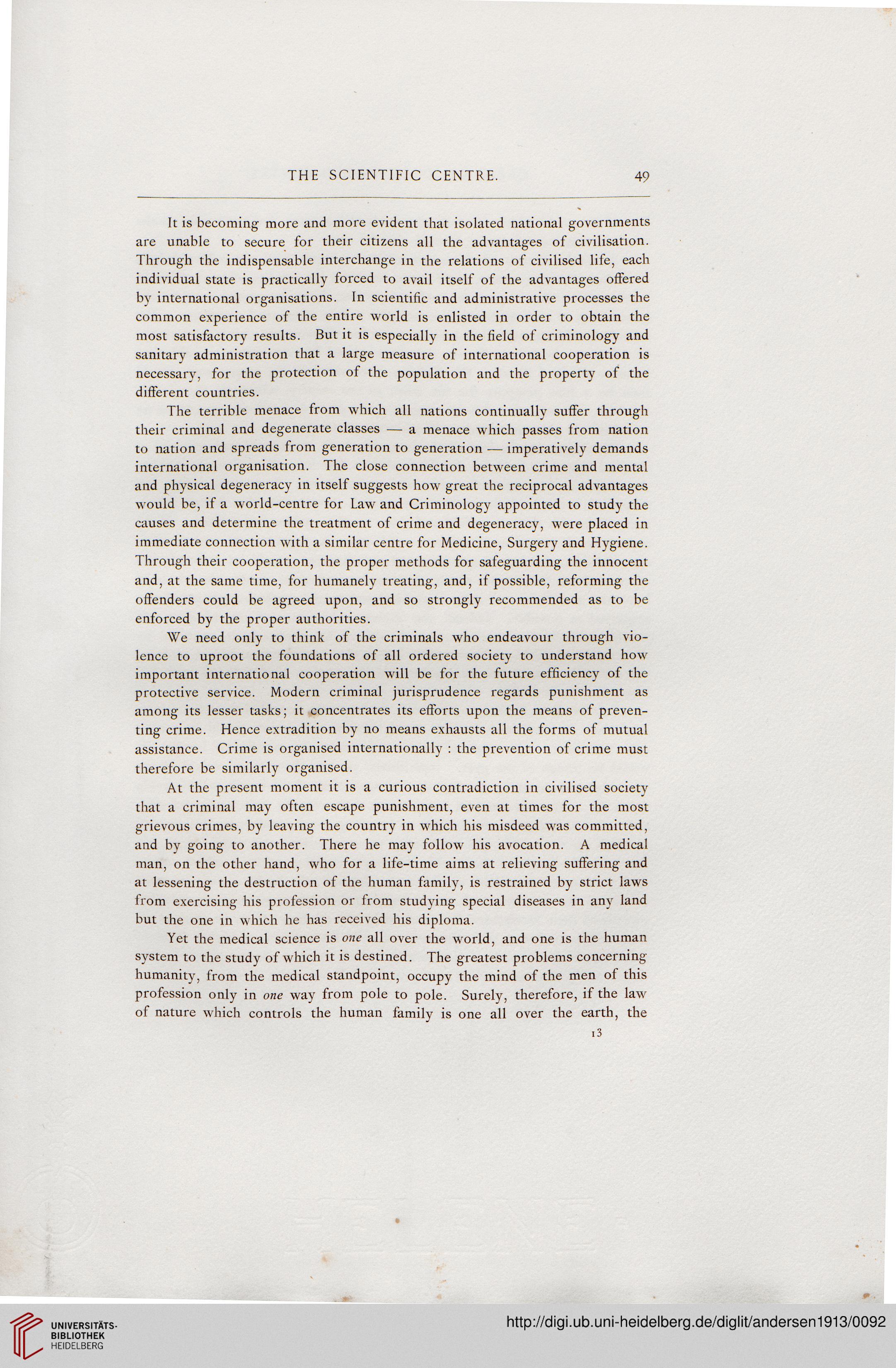THE SCIENTIFIC CENTRE.
49
It is becoming more and more evident that isolated national governments
are unable to secure for their citizens all the advantages of civilisation.
Through the indispensable interchange in the relations of civilised life, each
individual state is practically forced to avail itself of the advantages offered
by international organisations. In scientific and administrative processes the
common experience of the entire world is enlisted in order to obtain the
most satisfactory results. But it is especially in the field of criminology and
sanitary administration that a large measure of international cooperation is
necessary, for the protection of the population and the property of the
different countries.
The terrible menace from which all nations continually suffer through
their criminal and degenerate classes — a menace which passes from nation
to nation and spreads from generation to generation -— imperatively demands
international organisation. The close connection between crime and mental
and physical degeneracy in itself suggests how great the reciprocal advantages
would be, if a world-centre for Law and Criminology appointed to study the
causes and determine the treatment of crime and degeneracy, were placed in
immediate connection with a similar centre for Medicine, Surgery and Hygiene.
Through their cooperation, the proper methods for safeguarding the innocent
and, at the same time, for humanely treating, and, if possible, reforming the
offenders could be agreed upon, and so strongly recommended as to be
enforced by the proper authorities.
We need only to think of the criminals who endeavour through vio-
lence to uproot the foundations of all ordered society to understand how
important international cooperation will be for the future efficiency of the
protective service. Modern criminal jurisprudence regards punishment as
among its lesser tasks; it concentrates its efforts upon the means of preven-
ting crime. Hence extradition by no means exhausts all the forms of mutual
assistance. Crime is organised internationally : the prevention of crime must
therefore be similarly organised.
At the present moment it is a curious contradiction in civilised society
that a criminal may often escape punishment, even at times for the most
grievous crimes, by leaving the country in which his misdeed was committed,
and by going to another. There he may follow his avocation. A medical
man, on the other hand, who for a life-time aims at relieving suffering and
at lessening the destruction of the human family, is restrained by strict laws
from exercising his profession or from studying special diseases in any land
but the one in which he has received his diploma.
Yet the medical science is one all over the world, and one is the human
system to the study of which it is destined. The greatest problems concerning
humanity, from the medical standpoint, occupy the mind of the men of this
profession only in one way from pole to pole. Surely, therefore, if the law
of nature which controls the human family is one all over the earth, the
i3
49
It is becoming more and more evident that isolated national governments
are unable to secure for their citizens all the advantages of civilisation.
Through the indispensable interchange in the relations of civilised life, each
individual state is practically forced to avail itself of the advantages offered
by international organisations. In scientific and administrative processes the
common experience of the entire world is enlisted in order to obtain the
most satisfactory results. But it is especially in the field of criminology and
sanitary administration that a large measure of international cooperation is
necessary, for the protection of the population and the property of the
different countries.
The terrible menace from which all nations continually suffer through
their criminal and degenerate classes — a menace which passes from nation
to nation and spreads from generation to generation -— imperatively demands
international organisation. The close connection between crime and mental
and physical degeneracy in itself suggests how great the reciprocal advantages
would be, if a world-centre for Law and Criminology appointed to study the
causes and determine the treatment of crime and degeneracy, were placed in
immediate connection with a similar centre for Medicine, Surgery and Hygiene.
Through their cooperation, the proper methods for safeguarding the innocent
and, at the same time, for humanely treating, and, if possible, reforming the
offenders could be agreed upon, and so strongly recommended as to be
enforced by the proper authorities.
We need only to think of the criminals who endeavour through vio-
lence to uproot the foundations of all ordered society to understand how
important international cooperation will be for the future efficiency of the
protective service. Modern criminal jurisprudence regards punishment as
among its lesser tasks; it concentrates its efforts upon the means of preven-
ting crime. Hence extradition by no means exhausts all the forms of mutual
assistance. Crime is organised internationally : the prevention of crime must
therefore be similarly organised.
At the present moment it is a curious contradiction in civilised society
that a criminal may often escape punishment, even at times for the most
grievous crimes, by leaving the country in which his misdeed was committed,
and by going to another. There he may follow his avocation. A medical
man, on the other hand, who for a life-time aims at relieving suffering and
at lessening the destruction of the human family, is restrained by strict laws
from exercising his profession or from studying special diseases in any land
but the one in which he has received his diploma.
Yet the medical science is one all over the world, and one is the human
system to the study of which it is destined. The greatest problems concerning
humanity, from the medical standpoint, occupy the mind of the men of this
profession only in one way from pole to pole. Surely, therefore, if the law
of nature which controls the human family is one all over the earth, the
i3





